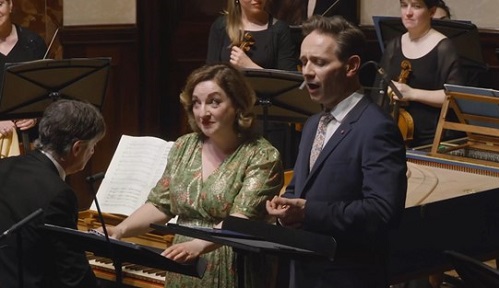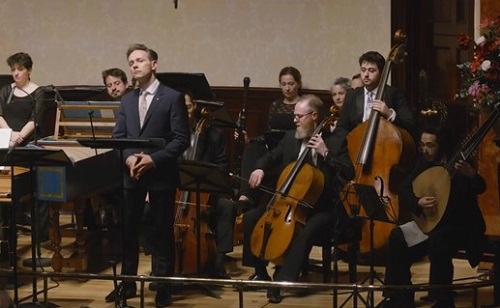Clori, Tirsi e Fileno is one of Handel’s many ‘dramatic cantatas’, composed during his Italian sojourn of 1706-10 and performed in the private homes and palaces of wealthy patrons, to circumvent the papal ban on public performances of opera. That they are inherently dramatic, and lend themselves to adroit staging, was made apparent when Bampton Classical Opera presented a slick and sprightly production of Clori, Tirsi e Fileno – one of the more substantial of the cantatas and probably first presented in the palace of Marquis Francesco Maria Ruspoli in Rome –at the Barn at Old Walland in October 2022.
The plot is a trifle but engaging. The hot-headed Tirsi and the more contemplative Fileno are both suitors to the fickle shepherdess Clori, who loves being adored rather more than she likes promising her own affections to a single admirer. She manipulates her wooers until the two frustrated would-be lovers decide to cut their losses, make their peace and reject the faithless Clori. Such an ending would not have been appropriate when Clori, Tirsi e Fileno was performed at a ducal wedding in Naples in 1708, so Handel provided an alternative, a final trio reflecting on the paradoxical painful pleasures of love.

Handel’s score is an absolute treat, as he must have recognised for many vocal and instrumental numbers found their way into later works, including Acis and Galatea, Agrippina and Rinaldo. What was striking about this performance by The English Concert at Wigmore Hall was the musicians’ vigorous celebration of the abundant youthful energy and confidence of Handel’s music, from the overture which glowed with vigour and panache – a masterclass in Baroque style and rhetoric; through the characterful arias, by turns sparkling, sensuous and sober and the fiery quarrels, the vocal emotiveness and exuberance complemented by some wonderfully expressive instrumental obbligatos.
Although this was a concert performance, the soloists took every opportunity to exploit Handel’s wit and dramatic deftness, immediately stamping their authority on their roles and developing the triangle of relationships with charming mischief. (The doors either side of the Wigmore Hall platform did good service too, the entrances and exits adding to the sense of intrigue and growing excitement and conflict.)

Joélle Harvey hinted at the fire that might subsequent erupt in her opening aria, ‘Cor fedele, in vano’, in which Tirsi laments Clori’s faithlessness which so contrasts with his own fidelity, her soprano crystalline but peppered with flashes of brightness that were given an added kick by the vigorous cello and theorbo of Jonathan Byers and Sergio Bucheli respectively. And, hands thrust in pockets, shoulders set with ‘attitude’, there was a bolder tone as Tirsi determined to hide in a cave and covertly watch Clori’s philandering.
Having witnessed the cause of his grief, Tirsi opens Part Two of the cantata with an eruption of fury, hurling charges at the barely chastened Clori. ‘Tra le fere’ was frighteningly fierce, Harvey’s soprano bursting with a fury which found release in stunning virtuosity and was matched for agility by some almost ferociously vigorous bowing from the strings. Having traded some spitting recitatives with both Clori and Fileno, in ‘Un sospiretto’ Tirsi reflects on the shared woes of the two smitten suitors, and here the soft sensuousness of the voice – along with some lovely violin playing and a deliciously decorated final theorbo chord – conveyed the tender poignancy of self-recognition.

Ailish Tynan relished Clori’s capriciousness, teasing her suitors shamelessly but using a wide range of vocal hues and the deep richness of her soprano to reveal the shepherdess’s alternating poses of nonchalance, sympathy and resentment. ‘Va col canto lusingando’ glowed with pastoral warmth. Having toyed coyly with Fileno in a the fidgety ‘Conosco che mi piaci’, she answered Tirsi’s accusations with tender protestations of love, but the scorned pleas turned to indignation in ‘Barbaro! tu non credi’, which Tynan made a masterclass of dramatic singing – flexible, florid, fiery. Nadja Zwiener’s brilliant violin obbligato worked in tandem with the voice as Clori both rebuked and beseeched. Her duet with Iestyn Davies’ Fileno at the conclusion of Part One, ‘Da quegli ostri e quel cinabro’, was an absolute delight, their voices entwining plushly, the central B section providing some shadow to cool the ecstasies of ‘rosy cheeks and red lips’, and Bucheli’s strumming theorbo whipping up joyous passion in the da capo repeat.
Entirely comfortable in the lower realms to which sometimes the role dips, Davies was a model of poised elegance as the meditative Fileno, though never neglecting – in voice and manner – the gentle ironies of Handel’s music. Each phrase of the accusatory ‘Ah crudel pastorella’ was carefully considered and expertly spun, the melismatic agility of ‘Son come quell nocchiero’ was brilliant, the alternating imagery of the text – all stormy seas and assuaging shores – beautifully rendered by the dark lower strings and sweet recorders (Sarah Humphreys, Katrin Lazar). Pathos imbued the sombre ‘Povera fedelta’ but the clouds lifted and the optimistic sun returned and ‘Come la rondinella’ was a highly decorated delight. The embellishment of the da capo exemplified how technique can and should serve expression, and Bucheli’s extensive obbligato was stunningly imaginative, whimsical and magical.

From the harpsichord, Harry Bicket conducted with a light touch, and often let his cellist and theorbist accompany the recitatives alone. The result was a performance that was flexible and characterised by terrific ensemble communication. Clori’s naughty backwards glance at the audience at the close sealed the dramatic irony, at the end of a super evening.
This performance was live-streamed and is available via Wigmore Hall’s streaming service and on YouTube.
Claire Seymour
Ailish Tynan (soprano, Clori), Joélle Harvey (soprano, Tirsi), Iestyn Davies (countertenor, Fileno), The English Concert (leader, Nadja Zwiener), Harry Bicket (director, harpsichord)
Wigmore Hall, London; Wednesday 18th October 2023.